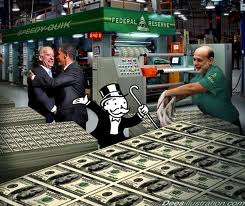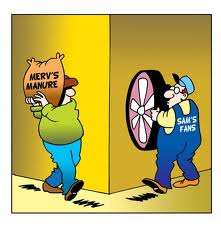Real Estate Is Grossly Overpriced
 Friday, March 8, 2013 at 3:00AM
Friday, March 8, 2013 at 3:00AM  The Real Estate Coroner gives her Toxicology Report: Real Estate died from too much governmental interference. At least that is what Peter Schiff says on page 2 of his book The Real Crash I purchased at the Cambridge House conference I attended. I even got it autographed! Be still my beating heart. Schiff is writ rather large on the hard money scene, so hearing him in person was interesting. It seems only correct to talk about him and what he had to say near the beginning of my series on the conference. I also plan to talk about his theories at the end of the series as well.
The Real Estate Coroner gives her Toxicology Report: Real Estate died from too much governmental interference. At least that is what Peter Schiff says on page 2 of his book The Real Crash I purchased at the Cambridge House conference I attended. I even got it autographed! Be still my beating heart. Schiff is writ rather large on the hard money scene, so hearing him in person was interesting. It seems only correct to talk about him and what he had to say near the beginning of my series on the conference. I also plan to talk about his theories at the end of the series as well.
Real Estate being overpriced is not something you will hear about in the "normal media." This would not fit the allowed talking points on Real Estate. Prosperity is just around the coroner corner. I actually disagree with him on this. My own theory is worse. I think that the market is so screwed that it is impossible to value anything. I am not saying that one cannot look at recent sales and get a rough idea of potential sale price. I am saying that the market is so destroyed with horrific market conditions that the government interference dominates the market and distorts all pricing signals.
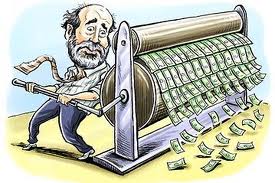 A. The strongest market destroying condition is the Federal Reserve in effect buying all residential mortgages in the US. It is charging less than the Market rate. Since most people do not buy a house, but a payment, this is propping up the real estate prices for homes. One estimate I read was that the amount of such purchases was 800 billion dollars for 2013. We know the already completed purchases for 2010, 1.25 trillion. What is the true price with such non-market pressures? I have no idea.
A. The strongest market destroying condition is the Federal Reserve in effect buying all residential mortgages in the US. It is charging less than the Market rate. Since most people do not buy a house, but a payment, this is propping up the real estate prices for homes. One estimate I read was that the amount of such purchases was 800 billion dollars for 2013. We know the already completed purchases for 2010, 1.25 trillion. What is the true price with such non-market pressures? I have no idea.
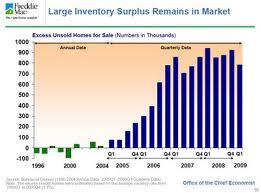 Are things better now? B. Another way that prices are being held higher than they would be is that many lenders are not foreclosing. A supply of such houses is a large overhang on the market. Yet at the same time when they do sell it is at a distressed price of course. But the supply of such houses is not enough to clear the market so you end up with a market that is bifurcated. These two different groups of prices are in competition. An appraiser will look to the upper group for their appraisals because if they don't, no sales will take place at all at that price with a loan. Which is the correct price? I have no idea.
Are things better now? B. Another way that prices are being held higher than they would be is that many lenders are not foreclosing. A supply of such houses is a large overhang on the market. Yet at the same time when they do sell it is at a distressed price of course. But the supply of such houses is not enough to clear the market so you end up with a market that is bifurcated. These two different groups of prices are in competition. An appraiser will look to the upper group for their appraisals because if they don't, no sales will take place at all at that price with a loan. Which is the correct price? I have no idea.
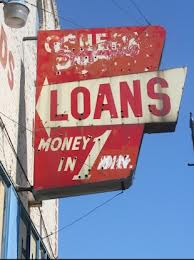 While these kind of loans are available at ridiculous rates, normal loans for normal people are hard to get. C. But there is also another factor that is driving down prices. It can be difficult now to get a loan at all. In the heady days of the housing bubble, if you breathed you could get a loan. If the fraud I have read about is any indication, you may not have even needed to breathe. Many home owners’ names and credit rating were used on loans they actually knew nothing about. As a result of the too-easy credit the bubble was made worse. Now, with a look to that history, it is too difficult to get financing on a home. Many people who could have gotten credit under normal circumstances before the bubble are unable to get credit now. This is driving prices down.
While these kind of loans are available at ridiculous rates, normal loans for normal people are hard to get. C. But there is also another factor that is driving down prices. It can be difficult now to get a loan at all. In the heady days of the housing bubble, if you breathed you could get a loan. If the fraud I have read about is any indication, you may not have even needed to breathe. Many home owners’ names and credit rating were used on loans they actually knew nothing about. As a result of the too-easy credit the bubble was made worse. Now, with a look to that history, it is too difficult to get financing on a home. Many people who could have gotten credit under normal circumstances before the bubble are unable to get credit now. This is driving prices down.
I am sure that Peter Schiff's opinion is that the forces of A and B are greater than C. He is probably right, but no one knows.
The same kind of forces are taking place in all markets right now. In such a situation, debt reduction seems to be the best option. Then, with a debt-free balance sheet, one might think about investing.
Where should one invest? That is one presentation I will discuss Monday. Until then here is a Peter Schiff interview by Doug Casey.



